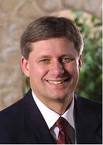Update: Thursday, Oct. 16, 2008, 9 a.m.

STEPHEN HARPER
Look to the near North if you want to take a glimpse at smarter-than-thou politics as executed in the recent nation-wide elections in Canada.
This week, Conservative Party leader Stephen Harper, the current prime minister, achieved a very significant re-election besting his Liberal opponent Stephane Dion, whose signature issue was to call for a carbon tax. (Great move, Dion, in perfectly playing the role of tax-and-spend liberal.)
Granted conservatives are still a minority in parliament, but they have public opinion and trust on their side in terms of managing Canada’s economy and its important role in fighting global terrorism.
Here’s what The Wall Street Journaleditorial page had to say about Harper in the Oct. 16 edition:
Since first taking the Conservatives to a national victory in 2006, [Harper] has reversed a pattern of parliamentary neglect of Canada’s armed forces and made proper funding for the troops a priority. Rather than flee Afghanistan as Mr. Dion wanted to do, Mr. Harper’s Canada is playing a crucial role in the international effort to defeat al Qaeda and the Taliban.
Mr. Harper’s first government also cut the national sales tax, personal taxes and corporate taxes. His domestic platform in this race promised to cut corporate taxes further to attract capital and grow the economy. Mr. Dion promised to levy a new carbon tax on business. Mr. Harper was able to explain to voters that a carbon tax is a tax on them. John McCain, take note.
Harper’s evangelical credentials are well-known (he’s associated with a Christian Missionary Alliance church in Ottawa). But what’s Harper’s secret sauce for persuading Canada’s electorate that he’s not George W. Bush, Sarah Palin, Pat Roberston, or Gary Bauer?
Let me suggest Harper is succeeding where other evangelical politicians (south of the Canadian border) are failing for the following reasons:
1. Harper actually is a conservative. As such, he has not muddied the waters between economic and social issues or preached big government, interventionist conservatism.
2. Harper has, for the most, part followed former British Prime Minister Tony Blair’s model of keeping his God talk below the media radar.
3. Harper, knowing the minority role of his party, has worked across party lines. Come to think of it, Harper has governed Canada sorta like Bush, as governor, ruled Texas for two terms.
Two notes of caution:
A. The prolife movement is no fan of Stephen Harper. Read this.
B. Harper’s views on gay marriage are less than many conservatives would like. There is no evidence that I could see that he would make fighting same-sex marriage in Canada a first-order issue. Read this.
Smart? Yes. Faithful? You decide.








